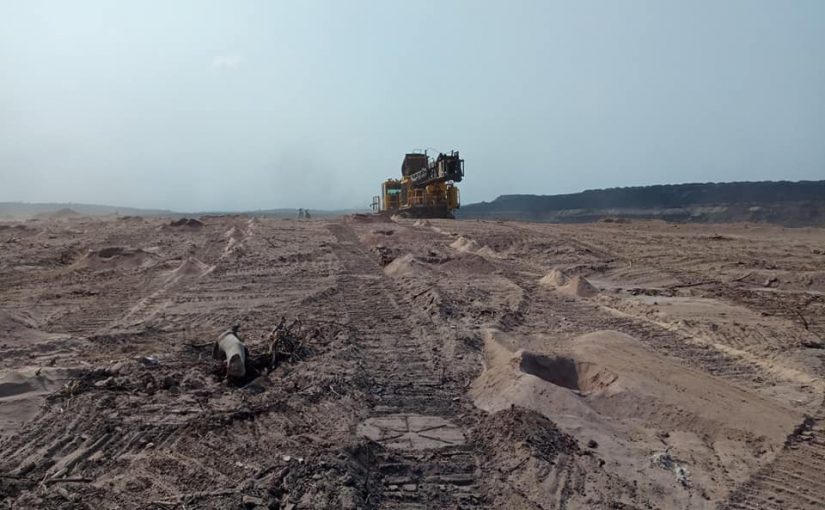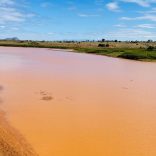African Energy Week: Major LNG projects in Mozambique, Nigeria edge closer to FID amid tight global ...
Stand-off continues between Vale and Moatize residents – AIM report

File photo: Amos Fernando / Facebook
There is still no sign of an end to the confrontation between the Brazilian mining company Vale and local residents of the area where Vale coal mining operations are taking place in Moatize district, in the western Mozambican province of Tete.
The residents shut down the Vale mine, known as “Moatize-2”, on 4 October because of the noise and dust pollution it was causing.
People living in the Moatize neighbourhoods of Bagamoyo and Nhantchere invaded the mine to force a stop to the explosions there. About 200 people broke into the mine despite the evident dangers – for, although it is an open-cast mine, parts of it are 30 metres deep. The 20 or so private security guards employed by Vale were unable to restore order. The demonstrators succeeded in halting the machines that were working at the time, in one case by hurling a rock through the windscreen.
The protesters want the mine to be closed definitively. Alternatively, the households affected could be resettled far away from the coal dust which threatens them with lung diseases. In addition to the dust, they say that the explosions in the mine cause vibrations which are damaging their homes, causing cracks to appear in the walls.
The protesters only left the mine after a meeting with Alan Cabral, the official in charge of the security of the mining equipment. Maxwel Abreu, a representative of the residents, told Cabral that they are demanding an end to mining until the pollution problems are solved.
“Invading the mine was our last resort”, he said, “given the failure of previous dialogue with the company management. We are tired of this situation of dust and the damage to our houses”.
Cabral promised that Vale-Mozambnique will cease its operations until consensus between the parties is achieved. The communities demanding resettlement also say that future meetings with the company should take place in one of the neighbourhoods, and without any intervention from the government.
The paralysis of the mine could cause Vale serious losses, and so the company and the Moatize district government called a meeting chaired by the Moatize District Permanent Secretary, Tiago Mendele, attended by about 100 people from the affected communities and by Vale technical staff, headed by Delmira Petersburg, in charge of the Sustainability area for the company.
Petersburg said the company will step up efforts to reduce dust emission by sprinkling the area with water. Vale was acquiring two more sprinkler trucks to keep the area damp. She said that the lack of rain, and the fact that the winds generally only blow in one direction were working against the company’s efforts to control the dust.
She said that Vale will continue negotiating so that the mine can resume working, but did not promise any resettlement.
The residents, however, did not budge from their demands. They insisted that there could be no more mining until their demands were met.
Vale proposed establishing a residents’ commission to continue reflecting on sustainable ways for mining to resume. The community wanted Vale to pay them. It suggested a monthly allowance of 5,000 meticais (about 84 US dollars) for each of the 6,000 households affected, while the company created the conditions to move the residents away from that area.
In Maputo, a meeting between Vale and the government, intended to look for ways of resuming mining, also ended without any consensus.
The Deputy Minister of Mineral Resources and Energy, Augusto Fernando, who was in Tete on other business, went to Moatize to meet the residents’ commission. Maxwel Abreu told him the mine would only start working again once the households were resettled – or if they were paid a monthly allowance. He added a demand that local brickmakers should be compensated.
Fernando warned that stopping the mine would have a serious effect, and would make all the Mozambicans who depend on Vale unemployed. They include not only the miners, but also all the workers at the Nacala-a-Velha mineral port, on the coast of the northern province of Nampula. The Nacala-a-Velha port, financed by Vale, depends almost exclusively on the coal from the Vale mine.
These arguments made little impact on Abreu. He said it was better for the country to do without the taxes paid by Vale than “compromise the future of an entire generation, because the inhalation of coal dust kills”.
Other speakers at the meeting argued that paralysing the mine will help Vale think of sustainable solutions acceptable both to the households and to the company.
ALSO READ: Vale Mozambique suspends activities in Moatize after “protest” – Watch













Leave a Reply
Be the First to Comment!
You must be logged in to post a comment.
You must be logged in to post a comment.